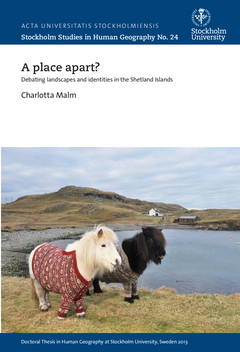This thesis explores a number of contemporary debates with a
bearing on landscapes and identities in the Shetland Islands – an
archipelago caught between the Atlantic and the North Sea – and
which physical location often seems notoriously difficult to ‘pin
down’ by outsiders. Meanwhile, islanders too may sometimes seem
at a loss, not so much in terms of where they are as who they are,
whether Scottish, or Scandinavian, or something that is neither of
the two.
Geographical and cultural location, belonging and tensions between
local and national interests are discussed by the author in relation
to several contested issues, ranging from landscape management
and nature conservation to place branding and island stereotypes,
with the overall purpose of investigating where people in this group
of islands currently ‘are’ in relation to questions of landscape and
identity. In this context, the thesis also highlights some aspects of
the interconnectedness of these concepts from different theoretical
perspectives as well as when expressed and enacted in the course of
everyday life.
The present study, which is distinctly place specific in character, is
set against a backdrop of devolved power structures, nation building
and the upcoming referendum on Scottish independence.


